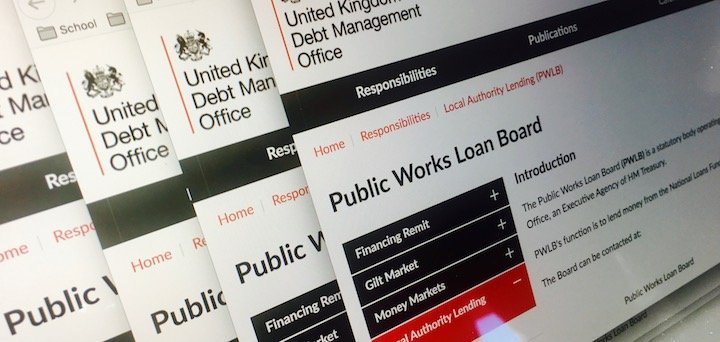Councils borrowed £680m from the Public Works Loan Board in August, with Spelthorne Borough Council taking more than half of the total.
The bumper month’s borrowing through PWLB was the second highest monthly total this year, and takes the total amount borrowed so far this year to £3.6bn – 89% higher than the first eight months of last year.
Spelthorne borrowed £343.2m in August, with much of the money going to fund the £285m acquisition of three offices which it announced last month. A source at the council said that some of the remainder would pay for stamp duty on the transaction, while some would go on a separate deal, details of which remain wrapped in commercial confidentiality.
A statement released by the council said: “In recent times the borough has acquired a number of new investments and the commercial terms of these acquisitions are subject to confidentiality clauses as would be expected in transactions of this nature.”
Terry Collier, deputy chief executive at the council, commented on recent reports of the scale of Spelthorne’s borrowing, saying: “A billion pounds is a good ball park figure for the borrowing we have done on property. However, we are paying off borrowing on these deals as we go along, so the amount is also reducing.”
But he played down worries raised in some quarters that the council is taking too much risk with the amount it is ploughing into the commercial property market.
He said: “As I said before we have a very thorough due diligence process and what we have been doing as we build up our process is develop how we use external advisers to check on all of the deals.”
According to Collier, the council would continue to borrow from PWLB for commercial property projects, but had not outlined a target or cap on the total amount it would invest using the borrowing.
However, he said the council is planning to shift more of its focus for borrowing toward funding housing projects delivered through its own housing delivery company.
While investment in housing would deliver a lower return than commercial property, “the main driver is looking to address housing needs of the borough. We have an ambitious programme because housing is such an issue locally”, said Collier.
Council leader Ian Harvey, in a statement to Room151, said: “The process we use to acquire properties is extremely rigorous, with a particular focus on ensuring long term returns that contribute to the running of services in Spelthorne.
“As we have stated before, we reject many times more investment prospects than those we review, and then many that are reviewed are also rejected.
“We take the role of ensuring the viable financial future of the borough extremely seriously and we are very proud of what we have achieved to date.”
Among other borrowing taken through the PWLB in August, Transport for London (TfL) took £100m.
A TfL spokesperson said: “This borrowing from the PWLB has not been raised for a specific project, but forms part of our planned borrowing programme for the year which will fund a wide range of TfL’s capital projects, as outlined in our business plan.
“This borrowing is within our authorised limit for external debt.”
In addition, Birmingham borrowed £75m for debt restructuring last month and London Borough of Croydon took £40m.
A statement from Croydon said: “This borrowing is part of our debt requirement for 2018/19 in order to fund our capital programme. Individual borrowing is not matched to specific schemes.”
Leeds City Council, who borrowed £30m in the month, stated that their loan was also not for funding specific capital schemes, but had taken place in order to meet the ongoing borrowing requirements set out in its treasury management strategy and capital programme.
“Our 2018/19 budget strategy allows for long term borrowing of £125m during 2018/19 as market opportunities arise.
“The recent borrowing of £30m from PWLB is in accordance with this strategy.”











